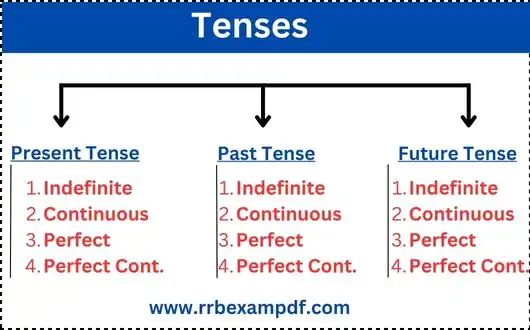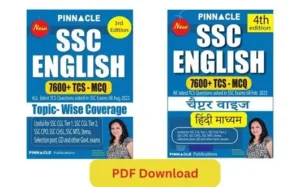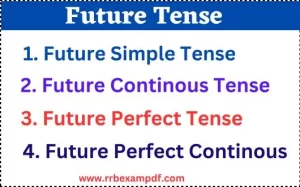Tenses in English Grammar with examples : Tense Definition, types of tenses in English grammar, tenses with examples, Tenses In English Grammar with examples pdf. Tenses play a vital role in expressing the time of an action, whether it is happening in the present, has occurred in the past, or will happen in the future. By using the appropriate tense, we can make our sentences clearer, more organized, and time-specific. In this article, we will explore different tenses with examples in both English and Hindi to help you understand them better.

Types of Tenses in english
Tenses in english grammar are Three Types-
- वर्तमान काल (Present Tense)
- भूतकाल (Past Tense)
- भविष्य काल (Future Tense)
1. Present Tense (वर्तमान काल)
Present Tense is also devide into four types-
- Present Indefinite/Simple Tense
- Present Continuous Tense
- Present Perfect Tense
- Present Perfect Continuous Tense
1 Simple Sentences (साधारण वाक्य)
Formula: Subject + Verb (base form) + Object
a) Simple Present Tense (साधारण वाक्य):
Example:
English: I go to school every day.
Hindi: मैं हर दिन स्कूल जाता हूँ।
b) Present Continuous Tense :
Formula: Subject + “be” verb (am/is/are) + Present Participle (-ing form of the verb) + Object
Example:
English: She is reading a book.
Hindi: वह किताब पढ़ रही है।
c) Present Perfect Tense :
Formula: Subject + “have/has” + Past Participle + Object
Example:
English: They have finished their work.
Hindi: उन्होंने अपना काम पूरा कर लिया है।
d) Present Perfect Continuous Tense:
Formula: Subject + “have/has been” + Present Participle (-ing form of the verb) + Object
Example:
English: I have been studying for two hours.
Hindi: मैं दो घंटे से पढ़ रहा हूँ।
2. Past Tense (भूतकाल)
Formula: Subject + Simple Past Tense Verb + Object
a) Simple Past Tense (साधारण वाक्य):
Example:
English: I visited my grandparents last week.
Hindi: मैं पिछले हफ्ते अपने दादा-दादी के पास गया।
b) Past Continuous Tense :
Formula: Subject + “was/were” + Present Participle (-ing form of the verb) + Object
Example:
English: She was studying all night.
Hindi: वह पूरी रात पढ़ रही थी।
Also Read: Rich dad and poor dad Audio Book
c) Past Perfect Tense:
Formula: Subject + “had” + Past Participle + Object
Example:
English: He had already eaten when I arrived.
Hindi: जब मैं पहुँचा, तब वह पहले से ही खा चुका था।
d) Past Perfect Continuous Tense :
Formula: Subject + “had been” + Present Participle (-ing form of the verb) + Object
Example:
English: They had been working for hours before they took a break.
Hindi: वे रुके।
3. Future Tense (भविष्य काल)
Formula: Subject + “will/shall” + Base Form of the Verb + Object
a) Simple Future Tense (साधारण वाक्य):
Example:
English: I will visit my friend tomorrow.
Hindi: मैं कल अपने दोस्त के पास जाऊंगा।
b) Future Continuous Tense :
Formula: Subject + “will/shall be” + Present Participle (-ing form of the verb) + Object
Example:
English: She will be studying when you call her.
Hindi: जब आप उसे फ़ोन करेंगे, तब वह पढ़ रही होगी।
c) Future Perfect Tense:
Formula: Subject + “will/shall have” + Past Participle + Object
Example:
English: By next year, he will have completed his degree.
Hindi: अगले साल तक, उसने अपना डिग्री पूरी कर ली होगी।
d) Future Perfect Continuous Tense:
Formula: Subject + “will/shall have been” + Present Participle (-ing form of the verb) + Object
Example:
English: They will have been working for six hours by the time they finish the project.
Hindi: जब वे परियोजना पूरी करेंगे, तब तक वे छह घंटे से काम कर रहें होंगे।
Tenses in English Grammar PDF
Tenses are the building blocks of English grammar. By understanding the formula and using appropriate examples, you can construct sentences in various tenses accurately. Practice and familiarity with these tenses will enhance your language skills and improve your communication abilities. Keep practicing and referring to this guide whenever you need assistance with tenses. Happy learning!



